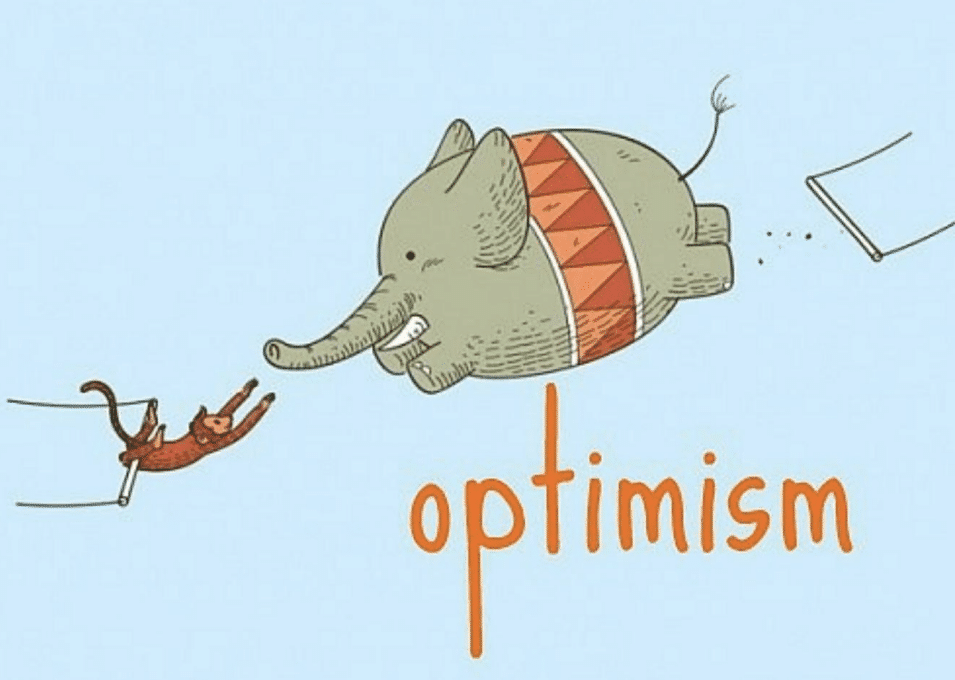I support optimism at all times. Whenever possible.
Relentless optimism if you can manage.
My optimism has admittedly occasionally annoyed, irritated, and even offended people. Earlier this year, someone asked me how I was doing, and when I responded with, “Great!” she said, “Everything is always great with you. Great this. Great that. Do you ever have a bad day?”
She was clearly having a bad day.
But my argument for optimism is simple:
Two people agree to attend their friend’s fusion jazz concert at the end of the month.
Person A optimistically assumes that the evening will be lovely, even though their friend has no discernible musical talent.
Person B pessimistically assumes that the evening will be dreadful and endless.
At the end of the month, both arrive at the small theater, take their seats amongst a scant crowd, and experience one of the worst musical performances of their life. Fusion jazz played on a cowbell is not good. Their friend’s choice to also sing – which was entirely unexpected – makes it even worse. The entire performance, which lasts more than two hours, sounds like a howling cat being clubbed to death by an empty can of soup.
Person A and B both leave the theater annoyed, frustrated, and suffering from headaches.
Person B was correct. The night was dreadful and endless.
But Person A – the optimist – spent the entire month wrongly thinking that the evening would turn out well. For 30 days, Person A moved through life absent any dread about the future, blissfully ignorant of the horrific evening that lay before them.
Person B, on the other hand, spent that month worried about the performance. Dreading the evening. Ominously counting the minutes until its disastrous arrival.
Both people suffered the same awful evening, but Person B also suffered a month of dread and gloom. For Person B, the pessimistic assumption that the evening would turn out poorly infected the rest of the month. Person B suffered more because of their assumption that things would turn out poorly.
Person B was correct, of course, but being correct came with a price. That price was increased levels of stress and angst.
I have a chapter in my new book, “Someday Is Today,” on the importance of optimism. It’s titled, “Pessimists Die Only Knowing That They Were Correct. Optimists Thrive.”
Optimists are happier people. They may be incorrect about the future at times, and even a little pollyannaish, but the lead up to that future is far more delightful.
It turns out that optimism might also be good for your health.
According to a new study of nearly 160,000 women of different races and backgrounds, higher levels of optimism are associated with a longer lifespan and a greater chance of living past 90,
In fact, healthy lifestyle factors, such as the quality of diet, physical activity, body mass index (BMI), smoking and alcohol consumption, accounted for less than a fourth of the association between longevity and optimism, according to the study in the Journal of the American Geriatrics Society.
This also isn’t the first study to find a strong link between longevity and optimism. A 2019 study found both men and women with the highest levels of optimism had an average 11% to 15% longer life span than people who practiced little positive thinking. In fact, the highest-scoring optimists were most likely to live to age 85 or beyond.
The results held true, the study found, even when socioeconomic status, health conditions, depression, smoking, social engagement, poor diet, and alcohol use were considered.
I may not eat as many vegetables as I should, but I’m offensively optimistic. I might just live forever.
If you’re not an optimist, fear not. There is hope for you. Studies of twins have found only about 25% of our optimism is programmed by our genes. The rest is up to you.
If you want to become an optimist, it’s entirely possible.
Look for positivity in this world. Focus on human advancement and societal improvements. Try to balance the bad news with some good. Remind yourself of your own successes, both large and small. Cultivate hope for your the future.
If you can do so, you’ll be a happier person. Your chances of living longer increase dramatically. People will enjoy spending time with you.
Maybe, if you’re lucky enough, you’ll even trigger some sour puss into a tiny tirade about your perpetually, relentlessly optimistic disposition.







